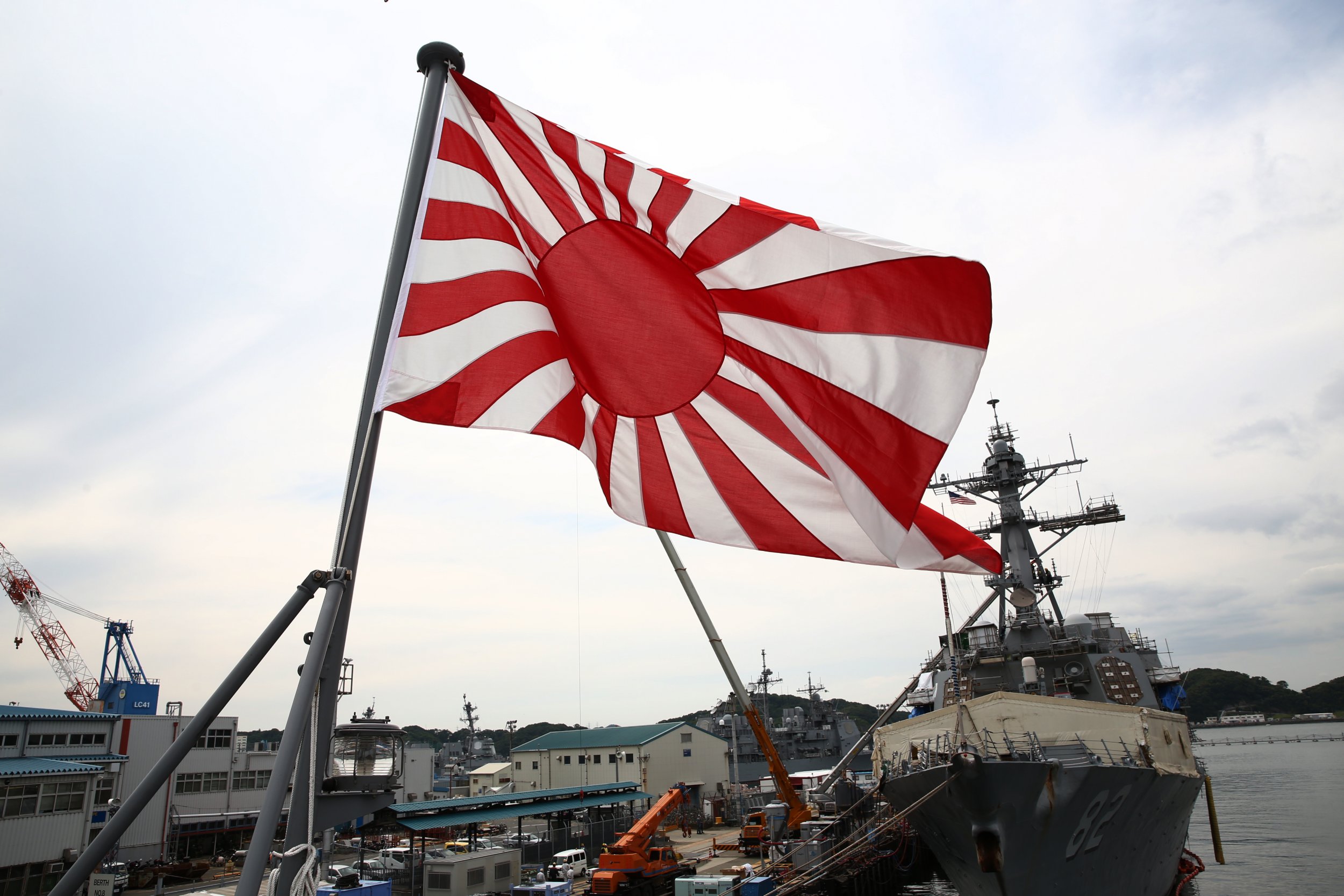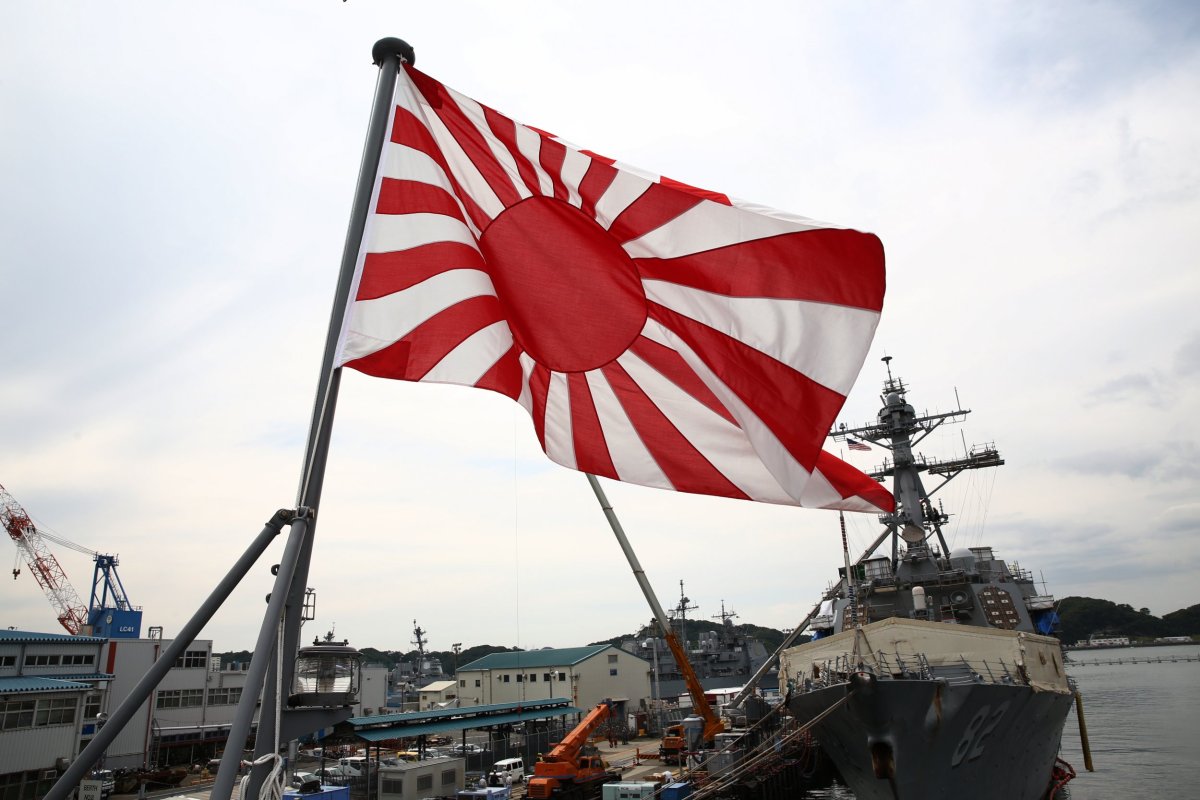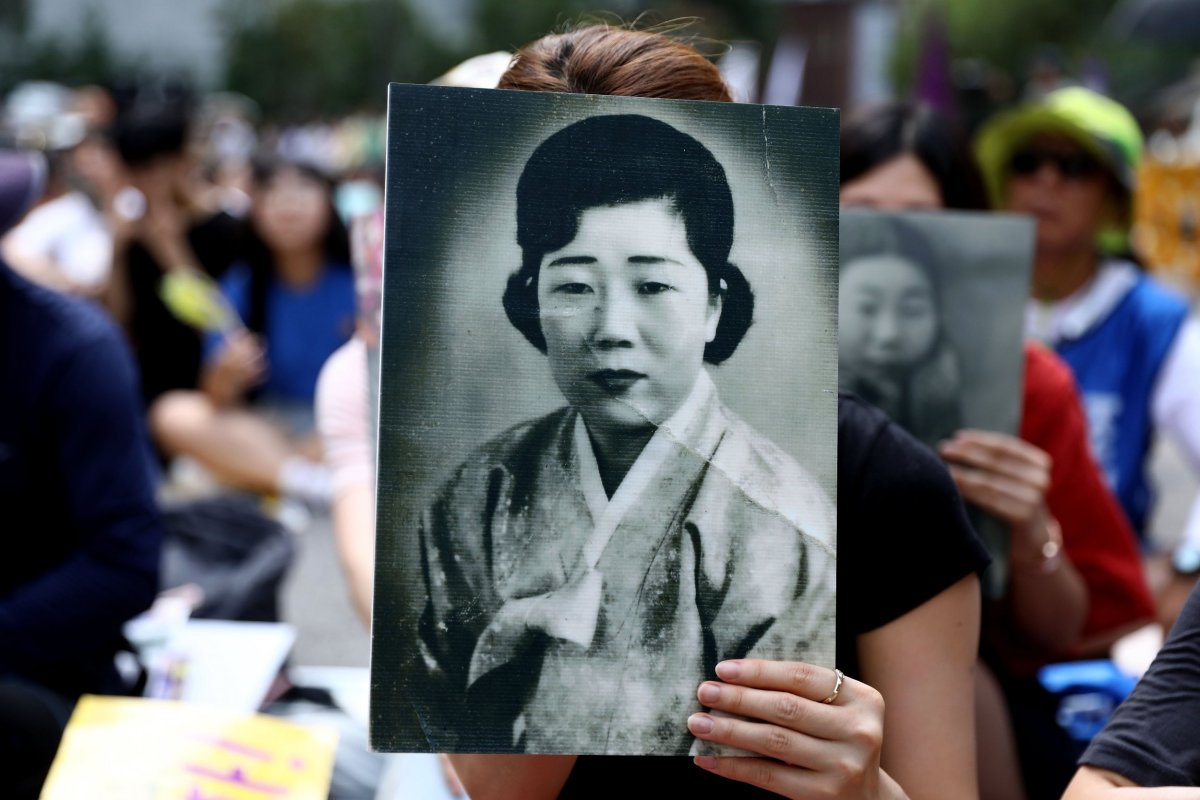
Japan has officially pulled out of joint naval drills with fellow U.S. ally South Korea after Tokyo refused to remove its military flag, a symbol associated with Japanese imperialism throughout much of East Asia.
The official flag of the Japanese Self-Defense Forces, the successor to the Japanese imperial military that fought alongside the Axis powers of World War II, remains the Rising Sun Flag used by various feudal warlords since the 17th century and officially adopted by the Empire of Japan in the late 19th century. The flag is a potent reminder of Japan's sweeping colonization and occupation of territories across the Asia-Pacific to many of the region's inhabitants.
The two rival states of the Korean Peninsula, which was occupied from 1910 until Japan's military defeat by Allied Powers in 1945, has long protested the use of this flag. The once-united Korea was split by Cold War powers the U.S. and the Soviet Union and have agreed on little since, but amid a recent and unprecedented rapprochement between the two, South Korea's navy demanded its Japanese counterpart not raise the controversial flag during the five-day International Fleet Review off Jeju Island.
In response, Japanese Defense Minister Takeshi Iwaya told reporters Friday that the country's mandated the fleet raise the Rising Sun Flag and said that "we have come to a point where we do not have any choice but to pass on our participation in the international fleet review."

Under Japanese occupation, Jeju Island saw massive protests against the imperial authorities in the 1930s, resulting in a harsh crackdown. It was just one of many incidents that have prompted the Japanese imperial flag's negative connotations in the minds of Koreans on both sides of the border.
Pyongyang has also spoken out against the presence of the Japanese flag on Korean territory. While North Korea has softened its hostility toward its southern neighbor and even the U.S. in past months, the notoriously hard-line communist state has increasingly targeted Japan in government-controlled media outlets. On Monday, the official Korean Central News Agency accused Japan of trying to reinstate the "Greater East Asia Co-Prosperity Sphere," a vast Japan-led imperial front of Asian countries that lasted from 1930 until Japan's defeat in 1945.
"Far from making an apology and reflecting on its past crimes of aggression, Japan tries to set foot in this land with the blood-stained flag of the Imperial Japanese Army again, not content with claim to 'dominium' over the inviolable land of Korea," the outlet's commentary read. "Japan is so shameless to demonstrate that it does not give up the old dream of the 'Greater East Asia Co-Prosperity Sphere' as a war-capable state."
"The wild ambition of Japan, the sworn enemy of the Korean nation, to harass peace can never be allowed. Japan's criminal war flag will not be hoisted on the land of Korea at all," it added. "All Koreans should come out as one in the struggle against the daily-growing ambition of the Japanese reactionaries to turn Japan into a military giant and their reinvasion moves."
Japan has expressed skepticism toward South Korean President Moon Jae-in's eager acceptance of North Korean supreme leader Kim Jong Un's recent diplomatic overtures, which have produced a record amount of high-level inter-Korean contacts and summits. Just last year, Kim displayed his country's improved military prowess by firing advanced missiles, some of which flew near and over Japanese territory, prompting nationwide alerts at times.

The two Koreas have aligned their position against Japan on other issues as well. Both countries have accused Japan of refusing to recognize its practice of forcing women from Korea and other occupied Asian countries to become sex slaves—known as "comfort women"—during World War II. In a 2015 deal deemed "final and irreversible," Tokyo agreed to pay out $8.3 million to Seoul as compensation, while a statue commemorating victims of the practice outside the Japanese embassy was relocated.
The deal did not assuage Koreans' anger, however. As recently as March, Moon referred to the comfort women practice as a "crime against humanity," and warned the Japanese government "should not say the matter is closed" in remarks that Tokyo called "not acceptable and deeply regrettable." On Thursday, as the Rising Sun Flag debate escalated in Asia, the Japanese city of Osaka cut its sister city ties with San Francisco over the California city's decision to erect a statue in honor of comfort women from 13 different countries, including Korea.
North and South Korea also assert control of two disputed islands and their surrounding rocks—known collectively as Dokdo in Korean, Takeshima in Japanese and the Liancourt Rocks in the U.S.—in the body of water known as the East Sea to the Koreas and the Sea of Japan to Japan. Earlier this year, just as North and South Korea were gearing up to kick off a warming of relations by participating jointly in the 2018 Winter Olympics, Pyongyang urged Seoul to keep the silhouette of the islands on a unified Korean flag despite Japanese complaints.
Uncommon Knowledge
Newsweek is committed to challenging conventional wisdom and finding connections in the search for common ground.
Newsweek is committed to challenging conventional wisdom and finding connections in the search for common ground.
About the writer
Based in his hometown of Staten Island, New York City, Tom O'Connor is an award-winning Senior Writer of Foreign Policy ... Read more
To read how Newsweek uses AI as a newsroom tool, Click here.








